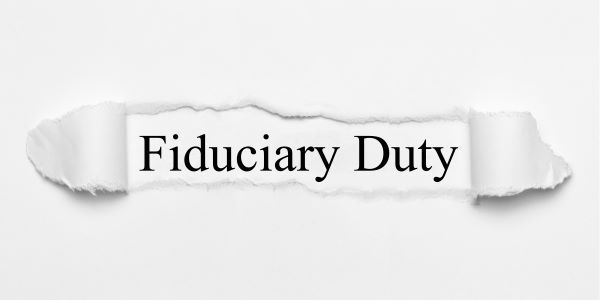
At some point in your life, you may be asked to become the power of attorney, guardian, executor of a will, or trustee for a friend or family member. There are many circumstances in which someone may ask you to act on their behalf. For example, they may be planning for the possibility they will become incapacitated and unable to act on their own behalf, or on the behalf of a minor child. They may be writing their will and planning for their estate to go through the probate process.
If you accept and are named as a guardian, executor of a person’s will, trustee, or power of attorney, the law calls you a “fiduciary.” You must act in the best interests of the person who has named you. You are required to act loyally and in good faith. The “fiduciary” relationship imposes the highest duty in law. If you violate that duty, you may become personally liable.
You must act selflessly. You are not allowed to use the person’s property for your own profit. You cannot give gifts to yourself or others if the person has not authorized you to do so. You cannot mingle the person’s property with your own. If you spend their money, you must carefully document the amount you spend and for what purpose.
What is a Fiduciary Relationship?
If you are the one considering who you would like to name as your fiduciary, you must be sure you trust that person absolutely.
A recent New Jersey probate case demonstrates what can go wrong when the appointed fiduciary does not act in good faith. A mother, Christine, named Patricia, one of her daughters, to be the executor of Christine’s will. Upon Christine’s death, Patricia, as executor, made decision’s about her mother’s estate. At the end of the process, her other daughter, Diane received a check from Christine’s estate for $10,000.00 – yet Christine’s house had sold for nearly $230,000.00.
The judge ordered Patricia to produce an “accounting” of where all that money had gone. An accounting is an inventory of estate assets and a record of all income and expenses expected to be kept by the fiduciary. Patricia refused to do so. Examination of the estate’s inheritance tax return revealed that despite a gross estate value of $319,368.00, the estate bank account contained only $6,886.00.
Patricia spent $40,000.00 on what she claimed were home repair expenses, but she could produce no building permits. She had also given herself $110,000.00 as “fees” for her executor duties, plus a “gift” to herself of $27,000.00.
The judge entered a judgment against Patricia of $200,422.00.
The case is In re Cenaffra, and can be found here:
https://law.justia.com/cases/new-jersey/appellate-division-unpublished/2020/a5731-17.html
Most people are not like Patricia. If you are named as guardian, trustee, power of attorney, or executor, follow a few simple principles. Make sure you don’t personally benefit from what you do with the other person’s property. You might be compensated fairly for your work, but refrain from doing anything that might look like a conflict of interest. If there are other beneficiaries waiting to receive their inheritance, be transparent. Keep the beneficiaries informed. Write down why you acted as you did, as it occurs. Document everything. Keep receipts.
If you have questions or would like to discuss your particular situation, please don’t hesitate to reach out. We help people determine who should act in their best interests, and we can help those who are already named. We welcome the opportunity to speak to you. Please contact us at (513) 916 1600 and schedule a free consultation to discuss your legal matters.

